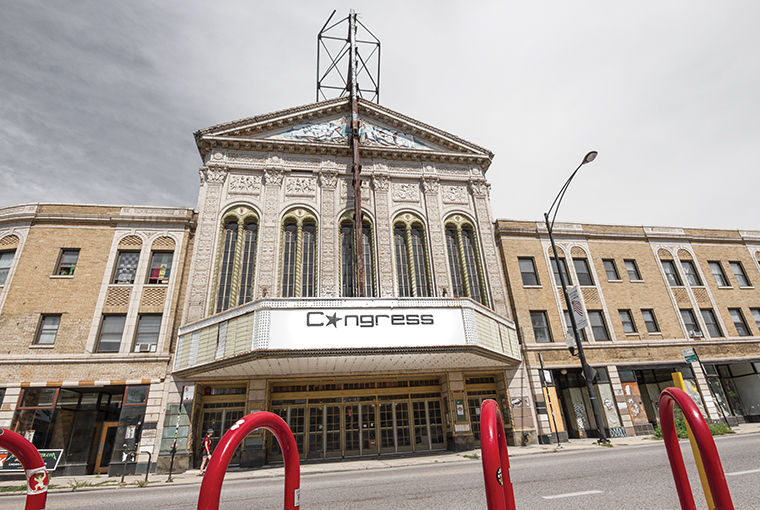Historic Congress Theater bans EDM shows from venue
After shutting down in May 2013, the Congress Theater in Logan Square has signed an agreement with the city to ban EDM shows permanently from the historic venue.
September 2, 2014
The Congress Theater, 2135 N. Milwaukee Ave., in partnership with the City of Chicago’s Local Liquor Control Commission, recently announced a ban on electronic dance music shows at the venue.
The iconic venue agreed to the ban in hopes of regaining the liquor license it lost in May 2013, which led to the Congress closing its doors. The operations plan created for the Congress Corporation by the city defines EDM as “music created by a DJ or multiple DJs using primarily specialized electronic equipment and software instead of traditional instruments, and an EDM performance shall be defined as a performance of Electronic Dance Music or any performance by a DJ or multiple DJs featuring the playing of pre-recorded music.”
Caitlin Collins, a Columbia photography major and EDM fan, said the electronic dance music scene in Chicago is welcoming, but the Congress was never high on her list of places to attend EDM shows.
“Out of all the venues in Chicago, the Congress is my least favorite,” Collins said. “I strongly dislike the Congress, so when there are shows there, I’m less likely to go.”
Prior to its shutdown in mid-2013, the Congress experienced a multitude of problems regarding the venue’s management and patron safety. For five or six years, owner Eddie Carranza allowed serious building and electrical code violations to proliferate within the building, according to Jim Derogatis, lecturer in the English Department at Columbia and co-host of Sound Opinions on WBEZ.
The Congress’ management staff also failed to properly control the security team. There were multiple issues reported between patrons and security, such as guards participating in the drug scene at the venue, DeRogatis said.
“[Carranza’s] security team was working at his venue and, according to court testimonies, were taking drugs from patrons and reselling them,” DeRogatis said.
DeRogatis said if a credible promoter bought the venue—granted Carranza decides to sell the theater—it could easily build up its reputation.
“The [Chicago] Park District is opening Humboldt Park, Union Park and Soldier Field to some of the harshest punk rock and EDM acts because money’s being made,” DeRogatis said. “It’s not about the city trying to block out EDM. The city will book anything that’s going to make the city money.”
Collins said that by banning EDM shows, the Congress Theater will be missing out on a massive opportunity for attracting customers and generating business.
“There are so many other venues in Chicago that [EDM] artists will play at,” Collins said. “So the Congress is going to miss out and other venues are going to do a lot better.”
Columbia art + design major and EDM fan Ellen Tran said she thinks the Congress Theater will be robbed of some business opportunities with the ban on EDM shows. Tran and Collins when it comes to fans going to other venues.
“I feel like it is kind of a loss for them because [EDM] is very popular these days, and some of the biggest shows that are selling out now are electronic concerts,” Tran said.
Despite the fact that the Congress Theater was a major host to EDM shows, DeRogatis said he does not think it will affect the Chicago EDM scene. He said the community within the EDM genre is being obscured by the EDM promoter SFX Entertainment, turning it into a corporate affair.
“I think you are going to see EDM become blander on the giant corporate level,” DeRogatis said. “I think you are going to see it become even more sponsored. I think it’s going to be the very lowest common denominator, all about the money. That’s great because that means the underground scene will only thrive.”








